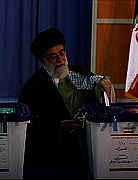What Does Epic Elections Mean?
» The Growing Number of Presidential Hopefuls
In his March 20th message to the Iranian nation, ayatollah Khamenei declared that the next presidential elections in the country would be an “epic” event. He also at least verbally opened up the candidates’ field by saying, “Anybody who feels they have the ability (to take up the job) should come forward.” Following that, Revolutionary Guard commanders, among others, welcomed the large number of unofficial candidates for the June presidential election and predicted that there will actually be “competitive elections” next month with an “increase in the number of voters.”
Speaking to Fars news agency which belongs to the Revolutionary Guards force (the IRGC), general Yadollah Javani, the former director of the political bureau of the IRGC, repeated ayatollah Khamenei’s Nowruz remarks and said the first step was the talk of “wide public participation.” Javani added that since the ruling establishment had created the means for wide participation, it would be natural to expect “competitive elections” to take place.
Javani is currently an advisor to ayatollah Khamenei and in his remarks also said that “enemies did not want such [healthy] elections to take place.” But Javani made perhaps a more important announcement in his remarks.
This year’s first issue of the IRGC’s official magazine Sobh Sadegh published by its political bureau went further and identified what the criteria for the elections to be epic were. The article in this month’s issue wrote that the two conditions for epic elections were, the competitive nature of the event and the public’s wide participation in them.
These remarks are important because they conflict with one of the two main views that have dominated the IRGC and Khamenei’s representatives on the issue of a large number of presidential candidates. Some of the ayatollah’s advisors had criticized the large number arguing this would make it difficult for the public to recognize the better candidates and would create a “challenge for the Islamic republic.” Others had welcomed the development. Ali Saeedi for example, who is Khamenei’s representative in the IRGC had called on the principlists to close ranks behind a shorter list of presidential candidates, while criticizing the division within the principlists’ faction.
Another cleric, Mohammad Ali Jafari also expressed dissatisfaction about the number of candidates when speaking to a group of Basiji militiamen.


